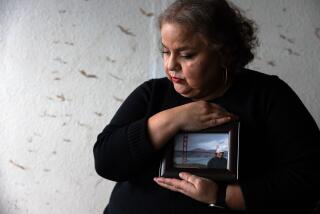Supreme Court justices wary of expanded rights for new immigrants
Supreme Court justices gave a mostly skeptical hearing Monday to a California woman who wants the State Department to explain why it barred her Afghan husband from joining her in this country.
The government argued it has an undisputed “power to exclude aliens” from entering the United States, and “there is no right to judicial review” of a decision to deny a visa to such a person, said Deputy Solicitor General Edwin Kneedler.
During questions and comments, the court’s conservative justices appeared to agree with the government’s position.
They said they were wary of establishing new rights that might encourage spouses, parents or children to go to court whenever one of their close relatives is barred from entering the United States.
The case of Kerry vs. Din asks whether a U.S. citizen has a right to an explanation after his or her spouse is turned down for a visa.
Fauzia Din, an Aghan native and a naturalized U.S. citizen, married an Afghan man in 2006 and sought to have him join her in this country.
But the State Department rejected his application for a visa in 2009, citing a provision of the law that bars foreigners connected to terrorist activities.
She denied her husband had any connection to terrorists and won a partial victory from the 9th Circuit Court of Appeals last year. Its judges said that as a married woman, she had a right to demand an explanation for the government’s decision to deny a visa to her husband.
Her position drew some support from the liberal side during Monday’s argument. Justices Sonia Sotomayor and Stephen G. Breyer said they were troubled by the possibility the government could make a mistake.
“That’s what we were told after Sept. 11,” Sotomayor said. The government said then it had good reasons for arresting and holding foreigners, only to admit later it made a mistake in some instances, she said.
Kneedler insisted the State Department double-checked before denying a visa, and that officials need not explain their reasons for excluding someone.
“There is no judicial review no matter what?” Breyer asked. What if the consular official denied the visa for racist reasons or because he thought husbands and wives should not live together, the justice asked.
Kneedler insisted such a scenario was not possible because decisions are reviewed by other officials and attorneys to prevent personal biases.
When Los Angeles attorney Mark Haddad rose to argue Din’s case, Chief Justice John G. Roberts Jr. and several of his colleagues said they did not want to extend new rights.
If wives have a constitutional right to go to court in such cases, they may also have a right to object when their imprisoned husbands are sent to a facility that is far away, Justice Samuel A. Alito Jr. said.
Haddad said that was different because a criminal had been convicted in court. In this instance, he said, Din’s right to due process of law had been denied. “There’s a complete absence of process. The entire decision-making is behind closed doors,” he said.
Justice Anthony M. Kennedy, who sounded uncertain at times, said he was not convinced the wife had a constitutional right to object in court, whether her husband was a prisoner or a foreign national.
“There’s no remedy where there are two citizens living in this country, and you want us to apply that remedy to a person who’s living out of the country,” he said. “National security interests are involved,” he added.
On Twitter: @DavidGSavage
More to Read
Start your day right
Sign up for Essential California for news, features and recommendations from the L.A. Times and beyond in your inbox six days a week.
You may occasionally receive promotional content from the Los Angeles Times.







